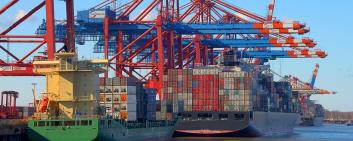Mr. Adler, what significance does international trade have for the Swiss economy?
Its significance is absolutely central. This is already apparent from the huge share that Swiss exports contribute to gross domestic product. Currently, trade with the EU is still dominant. But the importance of other markets, especially China, is steadily increasing.
In recent years, protectionist trends, at least on a political level, have been gaining momentum around the world. How does this affect Swiss exporters in their day-to-day business?
Currently, most people associate two events with protectionism: Brexit and Donald Trump’s election as US president. Of course, such events always have an effect. After the yes to Brexit, for example, the British pound depreciated, which could also be described as a form of protectionism, albeit an undesirable one. Have Brexit and Trump already led to very specific protectionist measures against Swiss companies? I would clearly say: no.
However, SMEs often hear that the framework conditions have become more difficult.
That’s true. In my view, this does not primarily have to do with protectionism, but with the strong Swiss franc. However, we often hear that SMEs have difficulties with so-called non-tariff trade barriers. These include different standards and regulations for products between countries, even within the EU, which of course make export difficult.
How should Swiss exporters position themselves in order to reduce their risk of being affected by protectionist measures in the future?
Allow me to give an example: in my view, one sector that is potentially more vulnerable to protectionism is the pharmaceutical industry. Its business success depends to a significant extent on a single agency: the US Food and Drug Administration (FDA). Medicines without FDA approval have practically no sales opportunities in international markets. This example shows: all sectors that are dependent on states in some way for their business, or are in direct competition with the local domestic industry, are potentially threatened. The situation is different for industries that are strongly integrated into global supply chains. This is often the case, for example, in supplier industries. If, for instance, a German car maker buys parts of a Swiss supplier business, it has nothing to do with nationality, but only with the quality relative to the price. All in all, it can be said: the more integrated Swiss companies are into global supply chains, the better they will be protected from protectionism in the future.
Do you see individual countries or regions where international business tends to be more difficult for Swiss companies?
From my point of view, one has to differentiate between what is currently being discussed in some countries and what is actually affecting Swiss companies. Take as an example the US’s threatened termination of the North American Free Trade Agreement (NAFTA). Among other things, the Trump administration aims to prevent cheap Chinese products from reaching the US via Mexico. I do not see that our high-quality Swiss products would be affected. Or take the example of China: of course, it is a country that strongly protects its domestic economy. At the same time, however, there is a free trade agreement between China and Switzerland that gives easier market access to Swiss exporters in China. As things stand today, I do not see a market in which Swiss companies are systematically disadvantaged.
In addition to globalization and protectionism, there is a third megatrend: digitization. How do you rate their influence on international trade?
In the long term, this is difficult to predict. It is clear that many industries can achieve enormous efficiency gains, thanks to digitization. The resulting cost reductions will certainly promote trade. But I also see a counter effect: Digitization goes hand in hand with further developments, such as automation and Industry 4.0. If you can produce goods with robots or 3D printers, that means you can potentially produce them anywhere in the world. This puts the necessity of international trade into perspective once again. In the service trade as well, the influence of digitization is not entirely clear. Take the example of a Swiss insurance company: thanks to digitization, it can negotiate trade barriers more easily and offer its services throughout the world. But if the same Swiss insurance company operates its back office in India in the future, it is no longer clear where exactly the service was produced and whether the trade flow actually started in Switzerland.
Will protectionist measures continue to increase? Or will the globalization of the economy continue to evolve instead?
The extent to which the globalization of the economy can evolve is difficult to predict. On the other hand, I do not think that there will be massive isolationist tendencies. Ultimately, the two dominant world economies, the US and China, have a vital interest in keeping markets more or less open. Both countries benefit greatly from international trade. A look at history should also be a deterrent for many countries: In the 1950s, for example, the development models of many Latin American countries, such as Argentina, Brazil or Mexico, were fully based on protectionism. These models have all failed.







